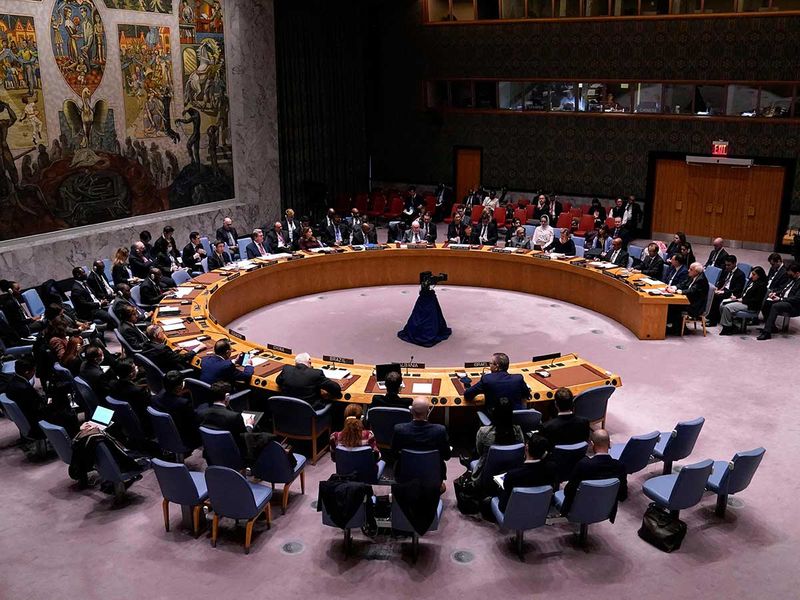
Were the Gaza war to be likened to a poker game, one could say that the US, as a player in it, has opted to go “all-in”.
In a poker game, the term “all-in” refers to a moment when a player finds himself in a bad spot and he, recklessly, bets all his chips — puts them all in the pot — on a single hand, giving his fate over to the next card, winning all or losing everything in a flash.
The poker version of this phrase has crossed over to general use and become part of the semantic mainstream, implying that if going all-in is considered a dreadfully bad idea in a poker game (as good poker players attest), it is considered an equally bad idea in political life: you go all-in, you go blind, and you lose all.
One can’t think of a more striking example of this protean colloquialism than in the spectacle of the United States’ evidently unconditional, no-questions-asked support of Israel’s cruel military campaign in Gaza — and no other word will do here than “cruel”, given the unimaginable scale of the mayhem caused there. Yet the US remains both steadfast in maintaining that support and vehement in its opposition to see it come to an end.
All that became clear when last week Washington vetoed a UN Security Council resolution drafted by the UAE that called for an immediate humanitarian ceasefire in Gaza. Note this: Of the 15 member states in this most powerful UN body, 13 voted in favour and one (the UK) abstained.
This posture has cost the US a great deal of political capital internationally (who, in the name of mercy, votes against a humanitarian ceasefire aimed at alleviating human misery, in this case one endured by well over two million innocent civilians!) and rendered the putative “leader of the free world” isolated globally, leaving it open to accusations of complicity in the mass suffering and the unspeakable destruction we’ve been watching daily on our television screens for the last two months.

Echoing that collective sentiment, Agnes Callamade, Amnesty International’s Secretary General, said: “By vetoing the resolution, the US has displayed a callous disregard for civilian suffering in the face of a staggering death toll, extensive destruction and an unprecedented humanitarian catastrophe in the occupied Gaza Strip”.
One would raise serious doubts about the professional skills of one’s optometrist were one not able to see for oneself that the current administration in Washington has gone all-in in its backing of Israel’s relentless efforts to gratuitously pound Gaza Gaza to rubble and take it and its people back to the Stone Age.
No conditions. No scrutiny.
Indeed, so all-in is the US behind that military campaign that on Friday, the very day the US cast its veto in the Security Council, the State Department, invoking an emergency provision in the Arms Export Control Act, bypassed a congressional review process that is normally required for arms sales to foreign countries, and pushed through a sale of 13,000 rounds of tank ammunition to Israel. No conditions. No scrutiny.
Secretary of State Anthony Blinken informed Congress that day that “an emergency exists that requires the immediate sale”.
No doubt you and I wonder, along with everyone and his uncle around the world, what that “emergency” could’ve been.
For many of us who care, there will be a day of reckoning for this administration when it is time to cast our votes in the ballot box in 2024.
Look, in a November 10, 1945 meeting with American diplomats brought in from their posts in the Middle East — virtually all of them opposed, for geopolitical reasons, to US support for Zionist ambitions in Palestine — then President Harry S. Truman reportedly told the gathering, “I’m sorry, gentlemen, I have to answer to hundreds of thousands [of voters] who are anxious for the success of Zionism. I do not have hundreds of thousands of Arabs among them”.
OK, now fast forward three quarters of a century. Today there are indeed “hundreds of thousands” of these voters in America — Muslim voters, Arab voters and in particular Palestinian Arab voters — who live in US states where a small segment of people casting ballots in a presidential election wield outsize influence.
The overwhelming majority of these voters appear to have already made up their minds about the candidate whom they will not vote for in 2024 — Joseph R. Biden.
And if that helps, disastrously, in the actual or potential return to the White House of Donald J. Trump, an erratic politician at best. Sometimes one’s principles must, eh, trump one’s self-interests.
— Fawaz Turki is a noted academic, journalist and author based in Washington DC. He is the author of The Disinherited: Journal of a Palestinian Exile






_resources1_16a45059ca3_small.jpg)

